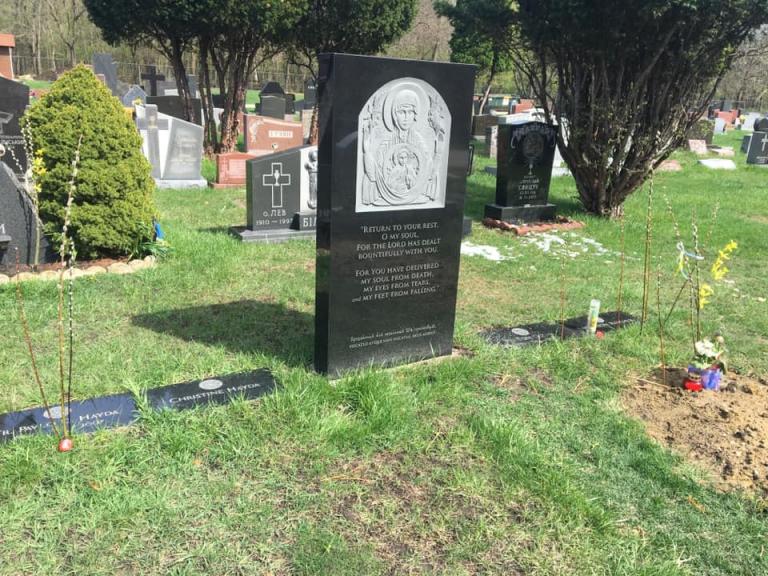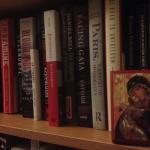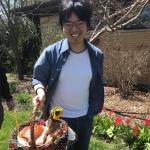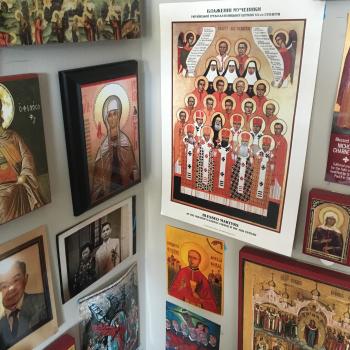
If there is anything by which I have been haunted over the Great Fast, it is the power of the father over my life in the creation of my consciousness as a good son. Fr Myron Panchuk, the ringleader of our Kyivan Psychoanalysis Study Group, died just before Forgiveness Sunday, and before he left this world, he said to me that it is only in the absence of the father that we come to a true form of maturity. What this means in a radical way is that the sense of my sonship also needs to go through an immolation in order for me to achieve a sense of adulthood. Kill the boy, Aemon Targaryen tells Jon Snow, and let the man live.
I think about this line as I spend Great and Holy Saturday, of all places, in Madison while I am at the annual meeting of the Association of Asian American Studies. My spiritual father remarked to me as I was searching for places to make do with what I could with this year’s Great and Holy Week services that part of the problem with being on the Old Calendar is that the world cuts you no slack. There is a certain Christian privilege that is associated with the New Calendar when it comes to Easter services, but the assumption is that having had a few days off for those celebrations, no Orthodox Christian should be privileged enough to have their own calendar. There is Christian privilege, and there is Christian privilege, and western hegemony even within the worlds of Christianity lead to only those on the Gregorian calendar having secular days off.
I have long thought about myself as a son of the church, and if I were to come off my nonchalant cynicism about the importance of Great and Holy Week services to me, I felt a bit devastated by the realization that I was going to miss a bunch of services, especially those in my home temple back in Chicago. But reflecting on this problem also led to me realizing that there is also a kind of infantilization that can happen in the academy. Long have I attached the meaning of my scholarly work to schools of thought and major figures who are attached to them. The joke among some who read my more recent writings may be that that person is Slavoj Žižek. But the truth is that I am trained in the social sciences, with a focus on the urban, and the longstanding debate in my fields, including in some recent books written by senior scholars like Aldon Morris and Gary Okihiro, is over the way that the Chicago School of Sociology has dominated conventions in social scientific research. Within the Chicago School, the conventions of everyday life often fit a pattern of assimilation into a liberal society, with the assumption that immigrants who move to North America are seeking the American Dream and want to become a model minority of sorts. I came to realize that I am as much a son of the Chicago School as I am of ‘the church,’ and much of the struggle that I have had within the academy has been in reconciling those liberal normativities with critiques of assimilation from a number of ideological fronts.
The son needs to die so that the person can live. I reflected as I came into my own in the critique of assimilationist liberalism and how I have joined critical fields of study that have sought to sharpen this analysis that if I have been adopted by anyone in my more recent academic quests, it is by those who engage in a kind of negative scholarship, that which critiques ideology and proposes what Okihiro calls an anti-history to conventional historical narratives. The same goes for the church, in the sense that if I am honest, I am not looking for mentorship, not even from my spiritual father, whose mode of mystagogy sought to put me on my two feet in the practice of discernment in my own right. I reflected to my sisters and brothers that I felt guilty for having missed some of the services of Great and Holy Week, but in the collective conversation that grew out of me sharing my guilt with them, they pointed out that I, like them, are making my way through a world that is normatively secular, in which the church may propose a counter-culture that might work for those who are employed by it, but not really by those of us who have real jobs and everyday lives. Our burden is the postsecular, to make do with the world on our own theological terms, which is a terribly messy process that requires constant negotiation, setback, and creativity.
I realized as Great and Holy Saturday wound to a close that such postsecular reflections were indeed close to the heart of our services for the day. Ours is not a day that is, as Hans Urs von Balthasar describes it, a ‘hiatus,’ a pause for the death of God in which we must linger in order to reshape our theology as coming from below, from the depths of hell where Christ has gone to lift up Eve and Adam and conquer death by his death. Hell is harrowed on this day, but it is not a break, a gap, a chasm. That which is coming up out of hell is already bubbling in our midst on this day, as the Hebrew Scripture readings at Vespers culminate in the declaration from the midst of the people, Arise, O God, and judge the earth, for to you belong all the nations. Rose petals are thrown, cluttering the church with evidence that something is rising from the surface of the earth, such that our entry into the temple for Pascha is in the mess of the flowers that already litter the sanctuary. The Son of God is dead, but even as the women in the Gospel according to Mark flee from the tomb in fear without really seeing the risen Lord, the evidence is there that he has risen from the dead.
But it is in our midst that the Lord arises to judge the earth. These are the words that my spiritual father led in front of the Chinese consulate in Vancouver during the Hong Kong Umbrella Movement in prayerful solidarity with those protesting in Hong Kong for political agency. It is in this week that some of the prominent activists on the street, including some associated with the movement’s precursor Occupy Central with Love and Peace, were jailed; it is in its wake that as we were still in Great and Holy Saturday on this side of the Pacific, protests broke out in Hong Kong over the threat of extradition laws that could be used to send dissidents to the mainland to be prosecuted. It was these events that brought me to the Kyivan Church; it is through them that I have offered theological reflections. Christ is in our midst, I reflect; he is our brother on the streets with us, dying as one of us, rising among us. In the death of the Son of God is our own sonship put to death.
The mystagogy of the Great Fast has now culminated in the reflections of Great and Holy Week. With the death of the father comes the death of the son. Rising with Christ among us, we too will come out of the tombs as adults, no longer dependent on the Name of the Father for meaning because we have passed from death to life as the Lord rises among us.












